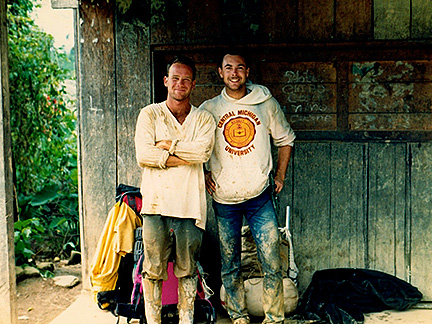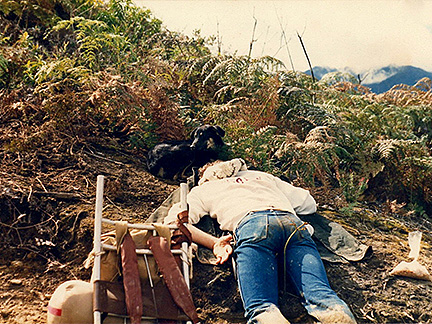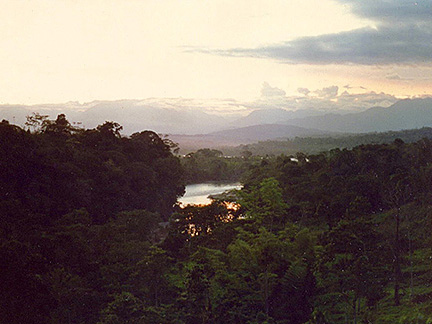A Writer Writes: “¡Sigue no más!“ by Folwell Dunbar
Through the Quagmire of Despair
By Folwell Dunbar (Ecuador 1989–92)
Author’s Note: “¡Sigue no más!” in Spanish means, “Continue no more!” or “Stop!” In Ecuador though, it had become a popular expression meaning, “Carry on,” or in my case, “Soldier on!”
•
When Mike Wooly stepped off the bus, he was carrying a vintage canvas Boy Scout backpack, an entire wheel of farmer’s cheese and a case of Pilsner, Ecuador’s version of Milwaukee’s Best. “¡Listo!” he exclaimed. “I’m ready!”
I had two bags of homemade granola, a box of iodine tablets and a small tarp. I figured I was “listo” as well.
Wooly and I had planned to spend our Peace Corps “Spring Break” in the Amazon. We would climb over the Andes and drop down into the jungle. There we would fish for piranha, learn the secrets of “la selva” from a wise shaman, and spot scarlet macaws, spectacled caiman and red howler monkeys. It would be the adventure of a lifetime.
It was. But not in the way we had imagined.
That night we shared the Pilsner with friends from town. “¡Dos días, pura bajada, y sequísimo!” they said — the trip would take no more than two days, would be almost entirely downhill, and, even though it was the rainy season, would be bone dry. Upon hearing this, Wooly began to hum the theme song from Gilligan’s Island. It would become a painful refrain.
The following morning, we asked a farmer for directions. He simply pointed at the cloud forest above town and said, “¡Sigue no más!”
As soon as Wooly, my dog Iko and I set out on our adventure, the rain began to pour. For the next five days it rarely stopped.
The first six hours were straight up. (So much for “pura bajada!”) The air was thin and the trail was steep. Neither of us, Iko excluded, was in Sherpa shape. Every fifteen minutes or so we had to stop and gasp for breath.
We trudged over deep ruts carved by the hoofs of livestock . . . cows, pigs and goats who had undoubtedly been as miserable as we were! With every step, we slipped a half step back. Or, we got stuck. At one point, Wooly fell backward like a failed limbo-ist. His boots were deep in one rut and his backpack was trapped in another. Like a tipped over tortoise, he flailed helplessly. When I finally stopped laughing, I pried him out with a eucalyptus limb.
Above the cloud forest, the path disappeared and the rain turned to sleet. Dressed for the Amazon and without a map or GPS, we wandered about shivering on the cold desolate high plateau.
That night, the three of us slept huddled beneath my tiny tarp, frozen bullets pelting our makeshift shelter.
The following morning, we finally found a pass through the mountains. On the other side, we took a narrow trail that zigzagged its way down a steep ravine, again, over unforgiving ruts. At the bottom, in a picturesque fog-cloaked valley, we entered the tiny town of Sam Miguel de Cuyes — Saint Michael of the Guinea Pigs. It was an oasis in the desert, a temporary reprieve from the quagmire of despair. The locals put us up in an empty one-room schoolhouse. Apparently, the teacher hadn’t shown up that year, so we had a dry place to stay. They gave us a bowl of “locro de papa” and, in honor of the town’s patron saint, two roasted guinea pigs.
On the morning of the third day, in the rain, a farmer passed us at a gallop. He was carrying a huge sack of potatoes, two chickens and a child. “How much farther to Gualaquiza?” we asked.
“¡Dos días, pura bajada, y sequísimo!” he said. “¡Sigue no más!”
As we descended into “la selva,” or jungle, stunted shrubs were replaced by towering trees and trickling steams turned to raging rivers. With every step down, the temperature rose by a degree. The humidity was as thick as syrup and insects swarmed even thicker. We stripped down to our shorts and the rain steamed off our bodies.
On the fourth day we plodded along in silence, using the leaves from elephant ear plants to shield us from the strafing rain. The granola and cheese were long gone by then and the iodine tablets had dissolved in their box. We dreamed of dining on monkeys felled by poison darts, we drank untreated water from rivers and ruts, and we sang,
Just sit right back
And you’ll hear a tale
A tale of a fateful trip,
That started from this tropic port,
Aboard this tiny ship . . .
Teddy Roosevelt on the River of Doubt had had an easier journey.
On the morning of the 5th day, we staggered into Gualaquiza, a tiny outpost on the edge of the Amazon. “¡Gracias a Dios!” Wooly exclaimed. “Civilization at last!” According to Wooly, “civilization” was a place where you could get a hot shower and a shave. Gualaquiza just barely fit the bill.
Unlike Louis Zamperini, the WWII prison camp survivor, we were definitely not “unbroken.” We were exhausted, famished, sick and, it goes without saying, wet to the marrow. We were also short on sucres, the Ecuadorian currency. So, we decided to abandon our Amazonian adventure and take the red-eye back to the Andes.
After our shower and shave, we ate at the only restaurant in town. Its menu consisted of three items: breakfast, lunch and dinner. We each ordered two “dinners.”
Knowing the bus ride would be a nightmare, Wooly and I proceeded to drink ourselves into a stupor. We bought a bottle of “aguardiente,” sanctioned Ecuadorian moonshine, and did shots with local jungle prospectors. Our plan was to pass out on the bus and wake up 12 hours later in the beautiful colonial town of Cuenca. Our brilliant plan though, had a fatal flaw: the size of our bladders.
About an hour into the trip, deep in the rainforest (and the rain), I stirred from my stupor. I had to pee.
Fortunately, the bus soon stopped. “It has to be a rest area,” I thought.
It wasn’t. It was a military checkpoint. The Ecuadorian government was on the hunt for the notorious and elusive Colombian drug lord, Pablo Escobar.
The aisle was packed with livestock and supplies; there was no way I could possibly get off in time. So, I pushed Iko off my lap and climbed out the window. Still “bien borracho” — drunk, I tumbled to the ground like a sack of crawfish and landed on my back in deep mud. As I fell, I heard someone scream, “¡Don Pablo!”
When I looked up, I squinted through a blinding light and saw three machinegun barrels pointed at my face.
“Pablo Escobar?” a soldier barked.
“No,” I said, “Estoy chuchaqui,” — stupid gringo — I’m hungover, and I have to pee really bad!”
“Do you have an ID?” he asked.
“No,” I said, “but I do have a friend and a dog on the bus who can vouch for me.”
“What is the dog’s name?” the soldier asked.
“Iko,” I slurred.
“Doesn’t Iko mean dog in Quichua?” he enquired.
“Yes,” I said, “but it’s spelled differently. I named her after a popular song in my hometown. It’s just a coincidence.”
The soldier, a bit perplexed, looked at the other men and then called out to his commander, “He’s too skinny and white to be Don Pablo. And, he’s got a dog named dog.”
The soldiers laughed as the commander ordered me to get back on the bus.
Covered in mud and shame, I took my seat with “Allcu,” peed in an empty bottle of aguardiente, and went back to sleep.
About fifteen minutes later, there was a sobering rumble and the bus suddenly listed to one side. We had been hit by a mudslide. There was absolute pandemonium inside. Chickens, goats and people all clambered for a way out. Once again, I was forced to climb through a window. We spent the next three hours excavating the partially buried bus.
Finally, the driver yelled, “¡Sigue no más!” and the bus lumbered forward.
At daybreak, we reached the crest of the Andes. It was, at last, “pura bajada.” To save gas, the driver turned off the engine and tobogganed down the other side of the mountain. After several hairpin turns, my stomach lurched in protest. I immediately yelled for a “funda” — plastic bag, but it was already too late. I lunged over the woman seated next to me as a torrent erupted from my mouth. For a brief second I was relieved to have missed the woman and cleared the bus. But, alas, my relief was short-lived. The “torrent” was sucked back in through the next three open windows and sprayed the entire back of the bus. It was a dirty bomb and the collateral damage was extensive. So much for Peace Corps diplomacy!
At this point I was pretty sure I had hit the bottom of the quagmire of despair, a sad place indeed.
But, I hadn’t.
As soon as we reached the Pan American Highway, we slammed into a horse. There was a violent “Thud!” The bus bucked twice and then careened off the side of the road. Passengers shrieked, looked back in horror at the convulsing animal, and then, as if on cue, yelled, “¡Sigue no más!”
And, we did.
“¡Sigue no más!” I thought, “¡Yes, soldier on!”
•
Folwell Dunbar is an educator, artist and survivor of many quagmires of despair. He can be reached at fldunbar@icloud.com
Click photos for larger images.




No comments yet.
Add your comment